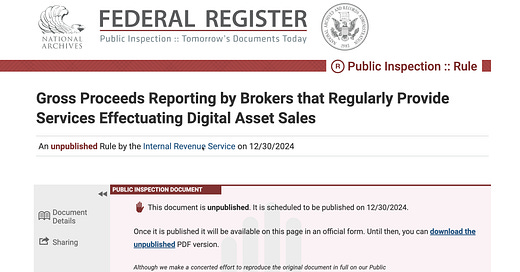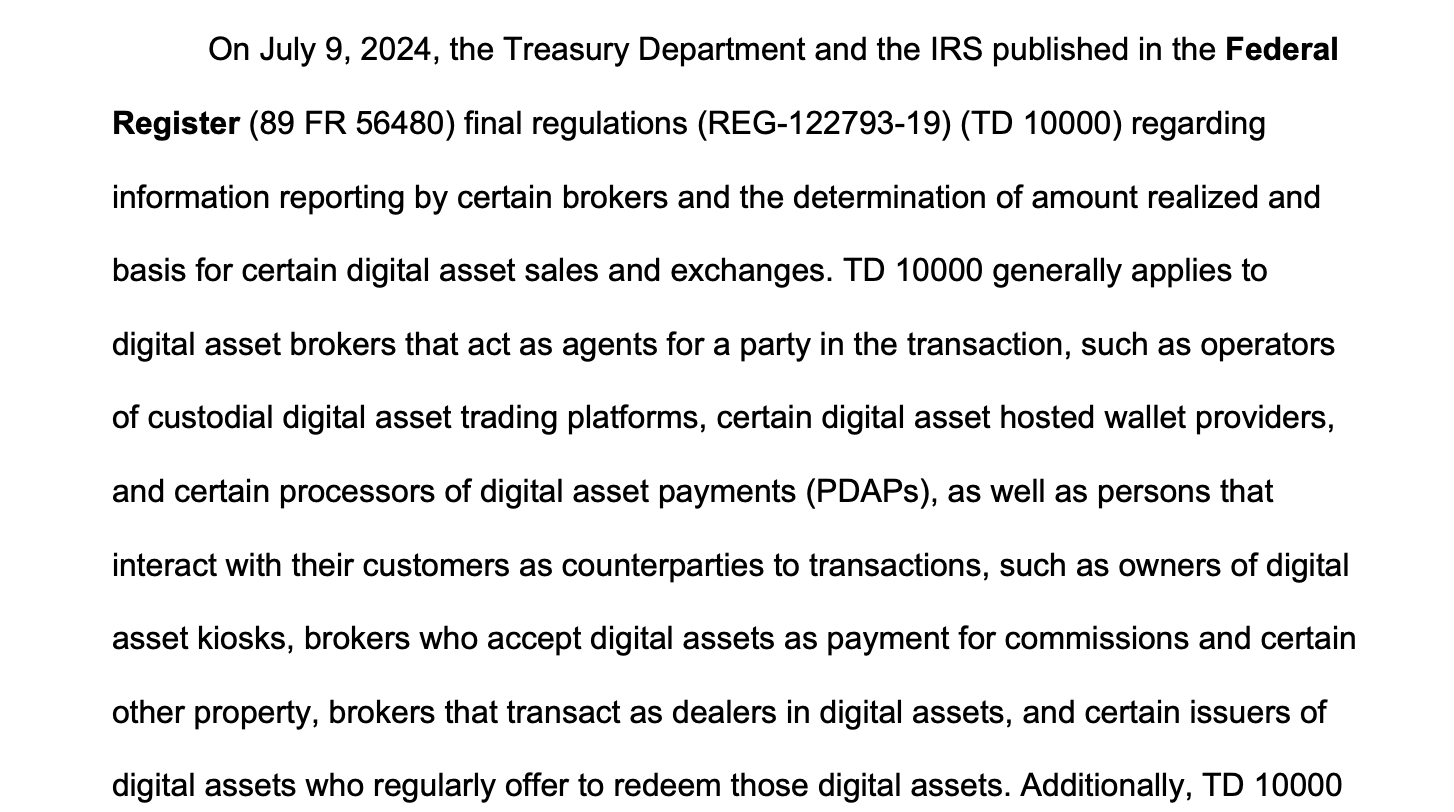I read the New IRS Crypto Publication on U.S. Digital Asset Broker Regulations coming into effect 1/1/2025 so you don't have to
Getting an official looking piece before the end of 2024.
TL;DR: Starting 2025, Everyone gets a 1099!
It’s nerd o’clock memo time. It’s time for me to talk about a Federal Publication impacting crypto companies: “Gross Proceeds Reporting by Brokers that Regularly Provide Services Effectuating Digital Asset Sales”
I read it it all so you don’t have to.
What is it?
Starting in 2025, certain crypto industries that are classified as brokers need to collect customer information via an IRS Form (W9 for the US, W8-BEN for Individuals / Companies).
DATES
Here’s your cheatsheet on timelines and deadlines:
February 28, 2025: Regulations become effective (assuming December 30, 2024, publication date).
January 1, 2025: Reporting of gross proceeds begins for transactions completed on or after this date.
January 1, 2026: Reporting of cost basis information begins for transactions completed on or after this date.
2026 Tax Year: First cost basis reports are due (filed in early 2027).

The Crypto Industries Impacted?
Any company that acts as agent of a transaction.
Custodial Digital Asset Brokers
Companies that host wallets as a service to you. I’m a big fan of Custodians. Coinbase Custody, Bitgo, and Anchorage, etc.
Non-Custodial Decentralized Finance (DeFi) Participants
For Example, Lending / Borrowing Platforms. If you don’t know how to think of this subcategory, think of peer-to-peer financing (torrenting?) using a technology as the intermediary.
Digital Asset Payment Processors (PDAPs)
On-Ramp, Off-Ramp, and any middle-manning
Kiosks and Dealers Accepting Digital Assets
Catch all description.

How will this impact the industry?
This was something that was known to industry for some time, and great efforts have been made to stall it, challenge it, or sue it out of existence.
Assuming all parts of the publication go into effect unchallenged, here’s what I think it’s going to do:A lot of paperwork, for the promise of investor protections.
Mainstream Time: This represents a grand shift toward mainstreaming cryptocurrencies within the financial ecosystem.
COMPLIANCE: Increased compliance costs become a barrier for new players and RegTech is going to have a moment in the crypto space.
TAX: We are going to need to adapt to a landscape where tax transparency and regulatory oversight become the norm.
Breaking it Down by the Industry in Crypto:
Crypto Exchanges and Platforms
Increased Compliance Costs: Exchanges like Coinbase, Binance US, and Kraken will face higher administrative and operational costs to implement systems for collecting and reporting tax data.
Everyone will need to invest in technology and staff to manage compliance. For you IT Auditors out there, here’s that “next job” for you to get in front of to make your millions.
Shift Toward Regulatory Compliance: Centralized exchanges will shift toward more transparent (though with who, is an eternal question) and aligned with government oversight. There will be pain in and suffering of course, and we’ll take no question. Smaller exchanges and non-compliant platforms have a barrier to entry in US Markets, or simply not play in the U.S. directly.
DeFi (Decentralized Finance) Platforms
Broader Classification of Brokers: DeFi protocols and operators (e.g., decentralized exchanges, staking platforms) may now fall under the IRS’s definition of “brokers” and face similar reporting requirements. This part is being disputed with requests for more time from DeFi companies
Some argue this could disrupt the DeFi ecosystem, which thrives on anonymity and decentralization, pushing some platforms offshore or toward greater regulatory compliance.
I think it temporarily thrives on anonymity, but what is really happening is 1) where do people “trust” their funds go, 2) how fast can we make it happen and 3) what airdrop incentives are there.
Institutional Investors
Greater Trust and Participation: Enhanced transparency and tax compliance could attract more institutional investors, such as banks, hedge funds, and corporations, to the digital asset market (or bring the Digital Asset Market into the Traditional Asset Scope). Tax reporting systems will play a huge part in reducing the perceived risks of investing in cryptocurrencies.
We’ve already seen traditional companies leverage digital assets as part of its corporate treasury strategy (M$TR).
Changes in Tax Planning: Institutional players will need to adapt to the speed of the industry (or at least faster than what they are used to).
Retail Crypto Investors
Simplified Reporting: The issuance of Form 1099-DA will simplify tax reporting for individual investors, as y’all will no longer need to rely solely on personal transaction records. However, investors engaging with platforms that fail to comply may still face challenges including getting a tax withholding on your tokens applied (22% - 27% is my estimate)
Potential Tax Enforcement: Increased reporting will enable the IRS to better enforce tax compliance, potentially leading to audits or penalties for underreported crypto income or gains. Though whomever gets audited first, will get some social credibility for being first.
Tax Advisors and Accountants
Boom in Demand for Crypto Expertise: Professionals specializing in cryptocurrency taxes will see increased demand as individuals and businesses seek help navigating the new requirements.
it’s me, hello
Increased Complexity: Accountants will need to manage a higher volume of 1099 forms, reconcile discrepancies, and advise on new rules for staking rewards, DeFi gains, and NFT sales.
And accountants weren’t already over worked
Blockchain Startups
Opportunities for RegTech Companies: Companies offering compliance and tax-reporting solutions will likely thrive as demand for their services increases.
There will be major opportunities every time a new protocol is launched and gains traction.
International Impact
Non-U.S. Platforms: International platforms with U.S. clients may also be subject to these rules, increasing compliance requirements globally. Or they’ll run. Some platforms might restrict access to U.S. users to avoid these obligations.
Cross-Border Taxation: The new rules will require more handling of international payments, impacting foreign investors in U.S. based crypto assets. Already a pain, lets add more.
ONE MORE THING - STAKING, CUSTODIAN, AND REPORTING
Because someone asked it: I have a Custodian for my crypto assets. On the Custodian’s platform, I staked assets into validators of my choosing using the wallets that are hosted on the Custodian’s platform. Am I subject to these reporting regulations?
Yes. Two Reasons:
All Custodians providing a hosting service of your wallets are considered a broker and need to report on their customers.
You made the conscious choice to stake, and therefore, generate income. No one forced you to stake; you could have easily just not stake.
Any way, Happy New Year everyone.





